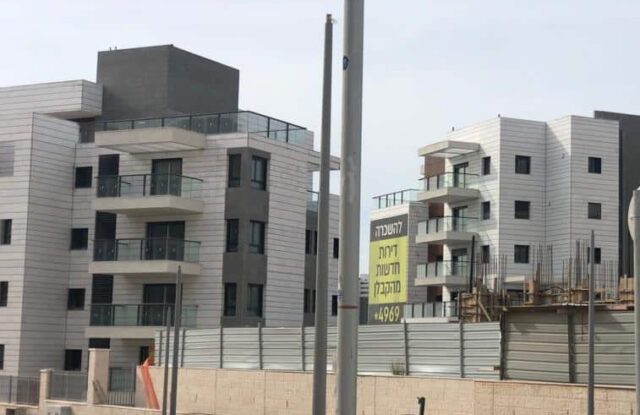As rental prices continue to rise at a rapid rate, the Municipality of Tel Aviv has formulated a new housing policy that requires every developer to allot a number of apartments for discounted long-term rentals. In nearby Givatayim, a plan for a 64-story tower containing apartments that will all be rented has been approved, and every week another similar deal is being signed. This is how a real revolution in Israel’s residential culture is being formulated.
It’s not easy to rent an apartment in Israel today, especially in the expensive Gush Dan area. After a year in which Israel real estate prices soared by around 20%, the number of households able to purchase a home has declined, intensifying the pressure on the rental market, which is also rapidly becoming more expensive. What makes the experience particularly unpleasant is the fact that Israel stands out in the developed world for its almost complete lack of supervision or regulation of the private rental market. In most cases, the rental contracts of apartments are for one year, at the end of which the landlords can raise the rental price, or not renew the lease at all because they want the apartment for their own needs. It is therefore an expensive, unstable, and unpredictable living experience.
The good news is that over the past few years, the various authorities have engaged in a series of actions in order to promote a long-term institutional rental market in Israel, which will serve as an alternative to both the private rental market and the privately-owned apartment market. This is by endorsing city building plans that require the allocation of some of the apartments for rent, granting tax benefits for developers operating in the field, and more. Following this, what first looked like buds sprouting forth with a project here and there, has become an inundation of such projects in the past year.
Pioneer in this field is the city where housing prices are the most expensive, and where approximately half of the households are renting – Tel Aviv. Last summer, the municipality’s management approved a new urban housing policy, which deals mainly with discounted residential solutions in the rental world. According to the policy, any new building plan promoted in the city will include a certain type of affordable housing. The municipality has established a new housing administration, which will be responsible for implementing the new policy in the city.
On private land, developers will be required to allocate 15% of all apartments for long-term rental for 20 years, at a price that is 40% lower than the market price, as assessed by an appraiser. The apartments will be distributed among households that meet the criteria defined by the municipality, and 25% of the apartments will be reserved for residents of Tel Aviv. In projects built on urban land, 50% of all apartments will be allocated for long-term rental, at 50% of the market price.
In addition, the municipality announced that it intends to encourage the construction of projects that will be used in their entirety for long-term rental housing, by creating a new land designation that does not currently exist in the city. Today, the zoning of the land both in Tel Aviv and in other cities in Israel is determined for residential, commercial, public institutions, and so on. However, Tel Aviv intends to create a separate designation of rental housing, in order to ensure that the planning of those complexes will be done in an adapted manner for rent, and in a way that will provide a higher return to the developers who will promote these projects.
The municipality stated regarding the plan that it has formulated following “the severe housing crisis plaguing the city, similar to many other global cities in the world. A review of the current housing policies of some of these cities revealed that even cities without an established infrastructure for affordable housing, have been able to significantly expand the residential solutions they offer to diverse population groups in terms of social characteristics and income levels, within a few years.” However, the municipality noted that despite its efforts, “significant government involvement is still needed to complete the picture.”
A tower of 500 apartments — all for rent
Alongside the maneuvers on the part of the local authorities, the entrepreneurial community is also beginning to wake up and adapt its own behavior. In November, the Tel Aviv District Planning and Building Committee received an application for an unprecedented plan to build a 64-story tower with 500 apartments intended entirely for long-term rental, with half of the apartments to be rented indeterminately and the rest for a capped period of 25 years. The tower will be built in Givatayim, located East of Tel Aviv, as part of a wider complex that also includes an 81-story office tower, which is being developed by real estate companies Tidhar and Union.
It should be noted that rent prices will be determined by the developer in accordance with the free market since this is not a project of the state-owned company Apartment for Rent, which allows rent control for a long-term period. However, the apartments will be managed by a management company and tenants will enjoy more certainty regarding the rent, which is lacking as stated in the private rental market.
Following the decision, the District Committee stated that “The mix of apartments in the tower will range between one room (studio apartments) and 2-3 rooms and will be intended to provide a solution for small households, young couples, and adults, within the framework of the trend of the Planning Administration for the construction of small apartments. It is located in the City of Givatayim, the main employment area adjacent to the Ramat Gan Stock Exchange, east of the Ayalon Highway.
157 Apartments in Yavne, 40 in Jerusalem
Last month, a number of events relating to long-term rentals took place, illustrating the wide scope of development and range of entities currently involved in this area, including real estate development companies alongside insurance companies and REITs traded on the stock exchange. Among the events was an agreement between real estate developer Almog and Harel Insurance to establish a joint entity that will specialize in long-term rental projects, called “Rent2Stay”. The first acquisition carried out by the partnership was two 20-story residential buildings in East Yavne with 157 apartments, which will be proposed in their entirety for long-term rental.
In another deal that took place this month, the residential REIT fund Magorit purchased 40 housing units for NIS 90 million in an urban renewal project on Jaffa Street in central Jerusalem, which is about to receive a building permit, with the intention of offering the units for long-term rental.
However, not everything is so rosy in the new industry. The Bank of Israel’s accelerated increase in interest in recent months, which brought the prime interest rate in a short time from 1.6 percent in June to 4.75 percent today, significantly increases the financing expenses of entrepreneurs. While it has made residential real estate projects for the purchase less profitable than in the past, they are nevertheless still economically viable, whereas the economic feasibility of long-term rental projects is more questionable, and therefore in recent weeks there has been a noticeable slowdown in the field.
Still, the dramatic change that is currently taking place in the residential culture, especially in the Dan region, is now impossible to stop. With each passing day, more and more plans are being advanced, which will lead the Israeli market, within a decade, to include tens of thousands of apartments intended for long-term rental.








